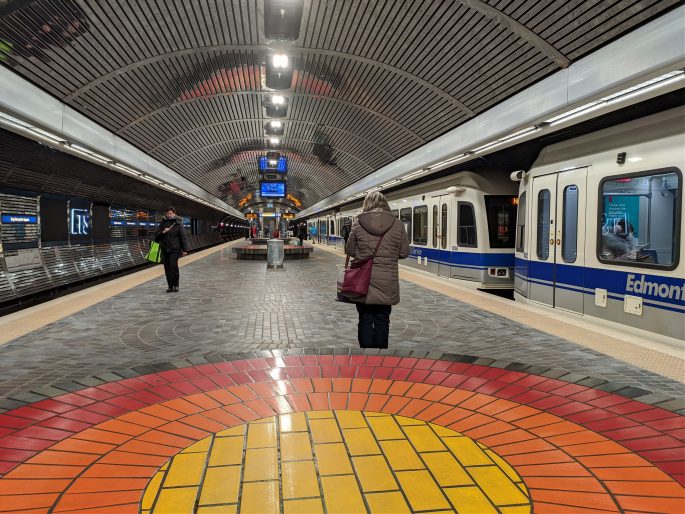A Canadian transit company is taking innovative measures to reduce the threat of the spread of infection at stations.
Edmonton Transit Service (ETS) is piloting new germ-killing push-plates at 10 of its transit centres and light rail transit stations. The push-plates are being installed on various entrance and exit swing doors and are being rolled out in a phased manner. The scheme began earlier this week at Bay/Enterprise Square LRT Station.
Edmonton Transit partnered with award-winning local Canadian biotechnology company Outbreaker Solutions for the project, which is intended to further enhance health and safety on transit for passengers and staff.
The push-plates are flat, made of highly compressed salt, and safe to touch. They look and feel just like ceramic tiles. Outbreaker has published research showing the push-plates are effective in killing the majority of germs, including viruses, bacteria and fungi in just a few seconds. This is due to the salt crystals piercing the membrane walls of the germs, effectively neutralizing them.
“We are excited to partner with ETS to launch our antimicrobial surface. This project is a major step forward for the commercialization of our fast, safe, accessible and passive infection prevention technology,” said Matt Hodgson, co-founder of Outbreaker Solutions. “The support from ETS has been incredible and it’s great to see a made-in-Edmonton innovation get implemented by the City of Edmonton.
“Our company is all about trying to prevent the spread of harmful pathogens on commonly-touched surfaces because after all, 80 per cent of infections are spread by our hands. We come in contact with some kind of contaminated surface and since we’re really bad at keeping our fingers out of our noses and mouths, pathogens enter our body, we become affected and this vicious cycle continues.”
Based on results from the push-plates at Bay/Enterprise Square LRT Station, along with public feedback, it is anticipated they will be installed at nine other transit facilities during the next month. This pilot project will last for six months.
“This is an exciting pilot project, not only because it’s a further safety enhancement for Edmontonians, but it’s also being done at no cost to taxpayers,” said Craig McKeown, Director, LRT Operations and Maintenance, ETS. “Supporting local homegrown innovation like this makes perfect sense, as it contributes to the local economy and talent in the city.
“It’s a great local story. We’re incredibly happy that we’re able to support local, homegrown innovation and Edmonton talent and it’s at no cost to the taxpayer so we’re providing the public platform to the benefit of both innovation and the safety of our ridership.”
Edmonton Transit is also electrostatically spraying LRTs, buses, and stations and working on a project to add anti-microbial seats to nearly two-thirds of its LRT fleet from late-January until March. These seats will have an antimicrobial additive in the plastic that can reduce up to 99.9 per cent of microbes within two hours. ETS is considering using this additive for any further seat replacement on buses and LRT.
Transit stations, such is their high-volume nature, can be hotspots for infection transmission, and programs like the GBAC STAR Facility Accreditation have not yet spread to include these locations in Canada.









